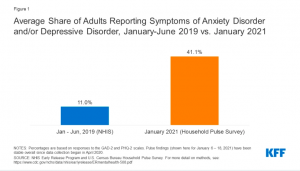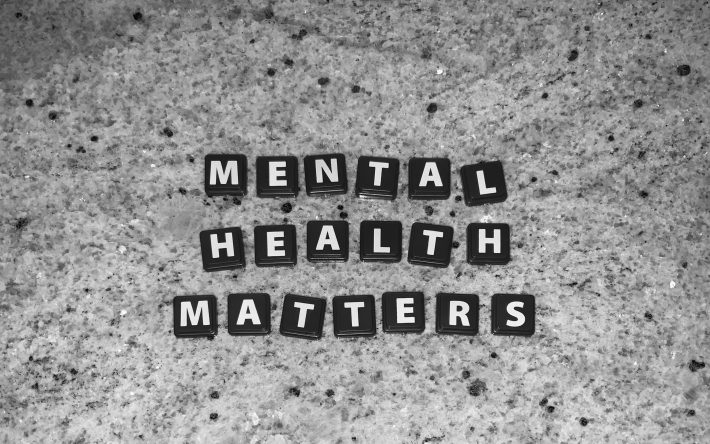As the coronavirus pandemic rapidly sweeps across the world, it has given momentum to a considerable degree of fear, worry and concern in the population at large and among certain groups in particular, such as older adults, care providers and people with underlying health conditions. As it wears on, ongoing and necessary public health measures expose many people to experiencing situations linked to poor mental health outcomes – rising levels of loneliness, depression, harmful alcohol and drug use, and self-harm or suicidal behaviour.

Figure 1: Average Share of Adults Reporting Symptoms of Anxiety Disorder and/or Depressive Disorder, January-June 2019 vs. January 2021
This essay compares the statistics of Americans with mental illness issues and substance use during, and prior to, the COVID-19 pandemic. It focuses on populations that were particularly at risk for experiencing negative mental health or substance abuse consequences during the pandemic, including young adults, people experiencing job loss, parents and children, communities of color, and essential workers. They have faced a number of pandemic-related obstacles – such as closures of schools, transitioning to remote work, and loss of income or employment – that may contribute to poor mental health.
In some countries, alongside the prevention mechanism toward COVID-19, a number of efforts are made to ensure the mental health among citizens as well. Due to the characteristic of the pandemic, most support for mental wellbeing to the citizens are done through online platforms. One honorable mention are the websites and hotlines built specifically for during the pandemic. Such websites, would dedicate the help to the people struggling with mental illnesses of all ages, backgrounds, disorders, with detailed guidelines on a variety of potential difficulties, from accessing medication, financial concerns, to managing mental disorders.
Unfortunately, mental illness remains a matter of little acknowledgment or coverage on official papers in Vietnam. Considering some alarming statistics showing the association between young adults and depression in Vietnam, this chronic illness mainly ranges from the ages of 15 to 27. According to research carried out by UNICEF, around 8% – 29% of young adolescents in Vietnam suffer from mental health disorders. It is estimated that, about 3 million young adults are diagnosed with mental illnesses. What is worth the consideration is the fact that only about 20% of the aforementioned have received adequate treatment and medical assistance. Even more, depression has emerged as one of the major contributors to the rising suicide cases in Vietnam. Yet little appropriate proposal has been made to prevent this situation.
Amidst the styled-up proposals for coping with the epidemic disease, the focus on mental health has been further driven away from what the authority and policy makers in the field of health in Vietnam take into account. The matter of mental illness is mostly taken lightly among environments full of juveniles. It is quite evident that mental health literacy remains a common obstacle when introducing the topic in Vietnam. Schools would lack infirmary offices equipped with mental health related precautions; some parents may find the topic of mental illness not worth being brought up to the table.
The significance of overcoming mental illness deserves more recognition and awareness in Vietnam. Hence, the fact that the measures to contain the spread of the COVID-19, such as, physical distancing and the closure of schools and workplaces, may have a negative impact on the mental health of the population, needs to be acknowledged. Vietnamese government, particularly the Ministry of Public Health, should take action to ensure that the mental health sector is prepared to help those struggling with anxiety and other stress responses in order to tackle mental health needs during the COVID-19 pandemic. In addition, I believe common means of dissemination through media and local announcements should be utilized to raise the awareness of mental health.
I have a friend who was diagnosed with anxiety disorder and clinical depression and has been living with it for 3 years. As his syndromes exacerbate, he searched for therapy treatments within his reach – he went to psychiatric offices in numerous hospitals, asking for consultancy and antidepressants medicine. The furthest he has put himself out was finding a personal therapist. Needless to say, the fee for each therapy session was too costly for a 20-year-old without a graduate degree to cover. Taking prescription and medication are by far some of the most efficient approaches to prevent seasonal hits of his mental disorder. Even more, the household he is under at the moment is not supportive of his treatment. They would often express disappointment toward his condition at times. In addition, they would regard this as “just a phase he’s going through” and assume he would eventually overcome it. It dawned on me that they seem to take his illness lightly. And in the course of the epidemic, I reached out to him to check up on him.
Much as the fact that this may come across as common knowledge to some individuals, it should be reminded that loneliness – a constant state of mind of a depressed person and also a common status as a result of social distancing, is associated with higher anxiety, depression, and suicide rates. During the pandemic, social isolation’s adverse health consequences range from insomnia to reducing immune function. Plus, one sometimes experiences anger and resentment about health and safety measures they find unnecessary or too restrictive. Even people who are supportive of safety-related isolation and quarantine, can experience frustration and irritability. Therefore, not only in the daily context should the matter of mental illness be taken into consideration; but also, during the pandemic when social distancing is prioritised and social interaction has taken a step back.
Sadly, what I believe is a social dilemma here, is whether or not an individual, particularly a young adult in this case, would be justified to call for legitimate help and assistance from the authority, during the turbulent state of the pandemic in Vietnam. Regarding the fact that most young adults are considered more privileged in terms of their physical condition, they tend to be excluded from the major concerns when it comes to vulnerable targets toward the pandemic.
On one hand, I am an advocate for the doings of covering the media with COVID-19 precautions. On the other hand, I believe the attention surrounding public health should be shifted toward the matter of mental health as well. However, one must acknowledge the effort made to assist Vietnamese citizens in terms of mental health. Similarly, to the tools utilized by the mentioned countries, the Ministry of Public Health has established a website for COVID-19 FYI with an article dedicated to mental illness preventive measures. Infographics were designed to enhance the reaching ability of the information.
Despite the attempt made so far, I find the content rather inadequate and lacking, especially when it comes to the manifestation and comprehensive coping mechanisms, mainly towards real-life circumstances.
Whatever the case, I believe the long-standing motto of guaranteeing health for citizens, is being more inclusive and multifaceted, which should be practiced more.
Mai Huong VU, Student of Faculty of International Studies, Hanoi University, Vietnam, 2021
REFERENCES:
Statistics on the Relationship between COVID19 and Mental Health
The Implications of COVID-19 for Mental Health and Substance Use. (2021, April 14). KFF. https://www.kff.org/coronavirus-covid-19/issue-brief/the-implications-of-covid-19-for-mental-health-and-substance-use/
List of websites of some countries on mental health assistance
Guidance for the public on the mental health and wellbeing aspects of coronavirus (COVID-19). (2021, May 18). GOV.UK. https://www.gov.uk/government/publications/covid-19-guidance-for-the-public-on-mental-health-and-wellbeing/guidance-for-the-public-on-the-mental-health-and-wellbeing-aspects-of-coronavirus-covid-19
National Health Plan: Supporting the mental health of Australians through the Coronavirus pandemic. Australian Government. Department of Health. www.health.gov.au.
Mental Health and Wellness. (2021, March 29). COVID-19. https://www.gov.nl.ca/covid-19/individuals-and-households/mental-health-and-wellness/
Assistant Secretary for Public Affairs (ASPA). (2021, May 14). Mental Health and Coping during the Coronavirus (COVID-19) Pandemic. HHS.Gov. https://www.hhs.gov/coronavirus/mental-health-and-coping/index.html
D.H. (2020, May 4). Bác sĩ chỉ cách vượt qua stress trong đại dịch COVID-19, ai cũng cần biết. ncov.moh.gov.vn. https://ncov.moh.gov.vn/-/bac-si-chi-cach-vuot-qua-stress-trong-ai-dich-covid-19-ai-cung-can-biet
Understanding the Effects of Social Isolation on Mental Health. (2020, December 8). Tulane University. https://publichealth.tulane.edu/blog/effects-of-social-isolation-on-mental-health/
T.H. (2020, November 25). Bé gái Hà Nội 12 tuổi thắt cổ qua đời vì trầm cảm không ai biết. Vietnamnet.vn. https://bitly.com.vn/bo09ub
L.A. (2020a, November 27). Bệnh trầm cảm ở người Việt: Nhiều nguy cơ đáng sợ nhưng ít được quan tâm. Vietnamnet.Vn. https://bitly.com.vn/3xg2d0
Tình trạng trầm cảm ở Việt Nam hiện nay. (2020). Vinmec. https://bitly.com.vn/7g0rog

Mental Healthcare Amid The Pandemic In Vietnam – FIS-HANU
[…] http://insidewestminster.co.uk/mental-healthcare-amid-the-pandemic-in-vietnam/ […]
Drug Rehab Pflugerville
Motivation is that the force that drives you to act, then rewards are what you gain from that activity.
These are the wise words you could hear upon entering.
I did not understand it first, but for the time being, I
already understand the thought of it. You’ll
get it too once you visit here.